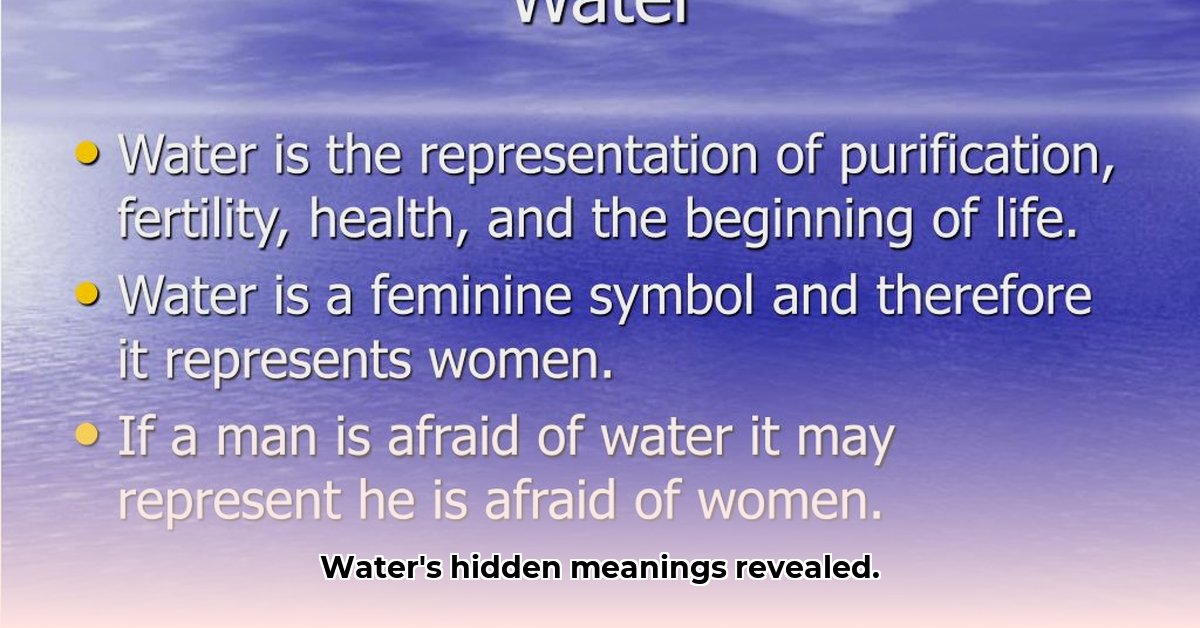Water, the lifeblood of our planet, transcends its essential role in survival to become a powerful symbol woven into the tapestry of human culture. From ancient myths to modern art, water embodies life, purification, transformation, and the complex spectrum of human emotions. This exploration delves into the multifaceted symbolism of water across diverse cultures, revealing its enduring power and the myriad ways humanity has interpreted its significance throughout history.
A Source of Life: Water’s Primordial Significance
Water’s association with life’s origins is deeply ingrained in human consciousness. Creation narratives across cultures frequently depict water as the primordial element from which all life sprung forth. The biblical story of Genesis, for instance, describes a world initially covered in water, from which God brought forth land and living creatures. Similarly, ancient Egyptian mythology venerated the Nile River, whose annual floods replenished the land and ensured the prosperity of the civilization. These floods were not merely natural occurrences but powerful symbols of rebirth and regeneration, inextricably linked to the cyclical nature of life, death, and resurrection. Indigenous cultures worldwide share a similar reverence for water, recognizing its life-giving properties and often ascribing sacred status to rivers, lakes, and oceans. The intrinsic connection between water and life is further reinforced by the continuous water cycle – evaporation, condensation, precipitation – which mirrors the ongoing cycles of birth, growth, decay, and renewal found throughout the natural world.
Purification and Renewal: Cleansing the Body and Soul
Water’s ability to cleanse and purify extends beyond the physical realm, encompassing spiritual and emotional purification as well. Across various faiths and traditions, water plays a central role in rituals of cleansing and renewal. In Christianity, baptism symbolizes spiritual rebirth and the washing away of sins. Islamic ablutions, performed before prayer, represent the purification of the body and mind. Hinduism incorporates ritual bathing in sacred rivers like the Ganges as a means of cleansing and achieving spiritual purity. These practices underscore the universal human desire to shed impurities, both tangible and intangible, and to emerge renewed and refreshed. The act of washing, even in everyday life, can evoke this sense of renewal, a testament to water’s enduring power to cleanse and restore. Whether it’s the immersion in a baptismal font, the ritual washing of hands, or the simple act of showering, water serves as a powerful symbol of purification and the ongoing quest for spiritual and emotional cleansing.
The Ever-Changing Current: Water as a Symbol of Transformation
The fluid, dynamic nature of water makes it a potent symbol of change, transformation, and the constant flux of life. Rivers carve new paths through the landscape, oceans ebb and flow with the tides, and water itself readily transforms between states – liquid, solid, and gas. These characteristics resonate with the unpredictable nature of life’s journey, with its inherent twists, turns, and metamorphoses. Ancient Greek mythology, with its powerful sea deities like Poseidon, captured this dynamic aspect of water, emphasizing its unpredictable power, capable of both nurturing and destroying. The image of a flowing river, constantly moving and reshaping itself, serves as a powerful metaphor for the continuous process of change and adaptation that characterizes the human experience. Water’s fluidity reminds us that life is not static, but rather a dynamic process of growth, adaptation, and transformation.
A Reflection of Culture: Diverse Interpretations of Water’s Significance
While the core symbolism of water remains remarkably consistent across cultures, specific interpretations vary, reflecting the unique perspectives and experiences of different societies. The ancient Egyptians viewed the Nile as the lifeblood of their civilization, a source of sustenance and prosperity. Hindus consider the Ganges River sacred, believing its waters hold the power to purify and heal. In some Native American traditions, water is associated with cleansing, healing, and the interconnectedness of all living things. These diverse interpretations, shaped by geography, history, and belief systems, enrich our understanding of water’s symbolic significance, demonstrating how different cultures have integrated its power into their rituals, myths, and artistic expressions. From the serene beauty of a reflecting pool to the raw power of a raging ocean, water’s multifaceted nature continues to inspire and intrigue, reflecting the depth and complexity of human experience.
Water in Art: A Fluid Canvas of Expression
Throughout history, artists have been captivated by water’s inherent beauty and symbolic richness. From ancient cave paintings depicting aquatic life to Renaissance masterpieces capturing the drama of the sea, water has served as a powerful source of inspiration. Claude Monet’s iconic water lilies series captures the serene beauty and reflective quality of water, while Katsushika Hokusai’s “The Great Wave off Kanagawa” conveys the raw power and dramatic force of the ocean. These artistic representations not only showcase the technical skill of the artists but also reflect the cultural values and beliefs associated with water in different time periods and artistic movements. The ever-evolving portrayal of water in art underscores its enduring power to evoke emotion, inspire contemplation, and connect us to the deeper mysteries of the natural world.
The Enduring Ripple: Water’s Timeless Symbolism
Water’s symbolism, as diverse as its manifestations, continues to resonate deeply within human culture. It represents life’s origins, the power of purification, the inevitability of change, the depths of human emotion, and the interconnectedness of all things. From ancient myths and religious rituals to modern art and literature, water’s symbolic power endures, reminding us of our profound connection to the natural world and the enduring mysteries that lie within a single drop. As we continue to explore and interpret the symbolism of water, we gain a deeper understanding of ourselves, our relationship with the natural world, and the timeless truths that connect us all.
- Unlock Water’s Symbolism: A Cross-Cultural Exploration - April 20, 2025
- Identify Black and White Snakes: Venomous or Harmless? - April 20, 2025
- Unlocking Potential: Origins High School’s NYC Story - April 20, 2025















